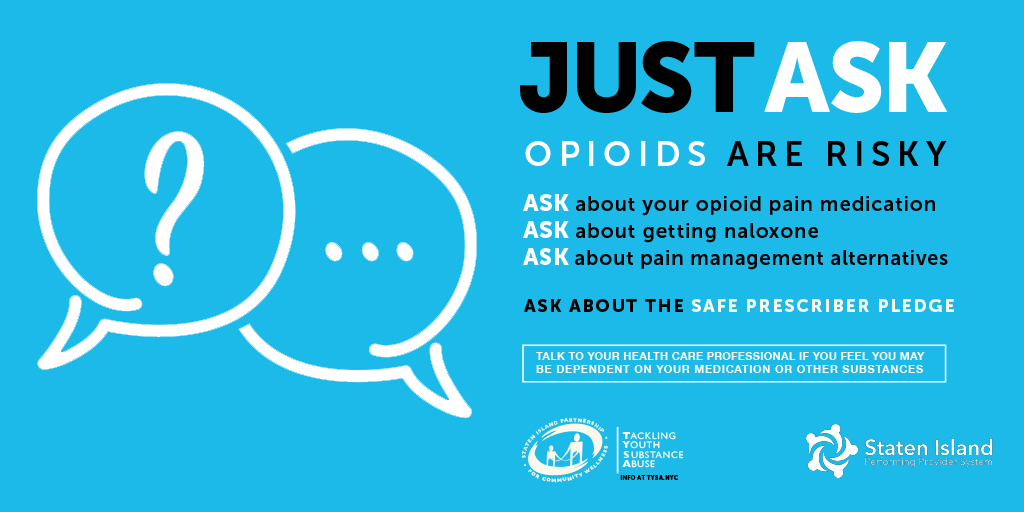JUST ASK
According to a nationwide study, almost 80% of people who used heroin reported starting with a prescription opioid.1 In NYS, the number of opioid prescriptions filled has dropped but Staten Island’s rates are still higher than the rest of the city. The Centers for Disease Control (CDC) has guidelines and resources to help doctors and patients understand opioid prescriptions. For example, opioids might be given after surgery for short term pain (acute). They also might be given for long term pain (chronic) like back pain. Despite these guidelines and other efforts to curb opioid prescriptions, we still need to make sure that people who get prescribed opioids don’t develop a dependency for the drug.
The Just Ask campaign will spark a conversation between you and your doctor. This is a great way for you to help prevent opioid misuse on Staten Island. Just Ask will cover how to talk about:
- Risks of opioids
- Different ways to manage pain
- How to get and use Nalaxone (reverses opiate overdose)
Patients/Community Members
The decision to start on an opioid is up to you. Some people benefit from opioids for pain management. Others can treat their pain with non-narcotics like advil, tylenol or physical therapy.
If you do choose to take an opioid prescription from your doctor, you should ask for naloxone (commonly known as Narcan). Naloxone is a life saving antidote (will reverse symptoms) for opioid emergencies. For more information on naloxone and where to get it, click here.
Have The Talk With Your Doctor
Just Ask these questions so you can make an informed choice:
– What are the risks of opioid medications? What are the benefits?
-If I do decide to use an opioid, should I also get a prescription for naloxone just in case of emergency? What is naloxone and how does it work?
-Are there any non-narcotics or other types of medications I can take instead of an opioid to manage my pain? Are there other types of healthcare professionals, like a physical therapist or acupuncturist, I can work with?
-Have you taken the Safe Prescriber Pledge?
Doctors
Have questions about opioid prescribing and other resources to prevent and manage opioid use disorder? Visit the Staten Island Performing Provider System (SI PPS) website and access a toolkit of opioid prevention resources and to take the Safe Prescriber Pledge.
Have questions on how to talk to your patients about the life saving opioid antidote naloxone? Click here to visit the city Department of Health and Mental Hygiene’s naloxone talking points.
To order materials for your waiting room or other public spaces, please contact Abigail Batista at abigail@sipcw.org.
Pharmacists
Have questions on how to talk to your patients about the life saving opioid antidote naloxone? Click here to visit the city Department of Health and Mental Hygiene’s naloxone talking points.
Want to educate your patients on safe medication storage and disposal and naloxone? Contact Abigail Batista at abigail@sipcw.org to order pharmacy inserts for distribution with all opioid prescriptions.
Citation
-
Muhuri PK, Gfroerer JC, Davies MC; Substance Abuse and Mental Health Services Administration. Associations of nonmedical pain reliever use and initiation of heroin use in the United States. CBHSQ Data Review. http://www.samhsa.gov/data/
2k13/DataReview/DR006/ nonmedical-pain-reliever-use- 2013.pdf. Published August 2013. Accessed October 8, 2015.


